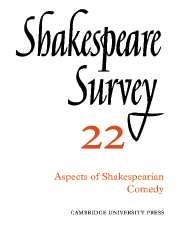Book contents
- Frontmatter
- Old and New Comedy
- An Approach to Shakespearian Comedy
- Shakespeare, Molière, and the Comedy of Ambiguity
- Comic Structure and Tonal Manipulation in Shakespeare and Some Modern Plays
- Laughing with the Audience: ‘The Two Gentlemen of Verona’ and the Popular Tradition
- Shakespearian and Jonsonian Comedy
- Two Magian Comedies: ‘The Tempest’ and ‘The Alchemist’
- ‘Thou that beget’st him that did thee beget’: Transformation in ‘Pericles’ and ‘The Winter’s Tale’
- The Words of Mercury
- Why Does it End Well? Helena, Bertram, and The Sonnets
- Some Dramatic Techniques in ‘The Winter’s Tale’
- Clemency, Will, and Just Cause in ‘Julius Caesar’
- Thomas Bull and other ‘English Instrumentalists’ in Denmark in the 1580s
- Shakespeare in the Early Sydney Theatre
- The Reason Why: The Royal Shakespeare Season 1968
- The Year's Contributions to Shakespearian Study 1 Critical Studies
- 2 Shakespeare’s Life, Times and Stage
- 3 Textual Studies
- Index
- Plate Section
Comic Structure and Tonal Manipulation in Shakespeare and Some Modern Plays
Published online by Cambridge University Press: 28 March 2007
- Frontmatter
- Old and New Comedy
- An Approach to Shakespearian Comedy
- Shakespeare, Molière, and the Comedy of Ambiguity
- Comic Structure and Tonal Manipulation in Shakespeare and Some Modern Plays
- Laughing with the Audience: ‘The Two Gentlemen of Verona’ and the Popular Tradition
- Shakespearian and Jonsonian Comedy
- Two Magian Comedies: ‘The Tempest’ and ‘The Alchemist’
- ‘Thou that beget’st him that did thee beget’: Transformation in ‘Pericles’ and ‘The Winter’s Tale’
- The Words of Mercury
- Why Does it End Well? Helena, Bertram, and The Sonnets
- Some Dramatic Techniques in ‘The Winter’s Tale’
- Clemency, Will, and Just Cause in ‘Julius Caesar’
- Thomas Bull and other ‘English Instrumentalists’ in Denmark in the 1580s
- Shakespeare in the Early Sydney Theatre
- The Reason Why: The Royal Shakespeare Season 1968
- The Year's Contributions to Shakespearian Study 1 Critical Studies
- 2 Shakespeare’s Life, Times and Stage
- 3 Textual Studies
- Index
- Plate Section
Summary
In the final moments of Edward Albee’s The American Dream, the mother—a bit tipsy—begins to seduce The Young Man, who has just been adopted by her family to replace another young man, now lost. Mommy mumbles:
Something familiar about you. You know that? I can’t quite place it.
Then Grandma interrupts and speaks directly to the audience:
Well, I guess that about wraps it up. I mean, for better or worse, this is a comedy, and I don't think we'd better go any further. No, definitely not. So, let's leave things as they are right now—while everybody's got what he wants... or everybody's got what he thinks he wants. Good night, dears.
Albee's Grandma protests too much. Certainly she knows that, for a traditional comedy, the audience does not expect the kind of situation that has been developing. Although Albee tries to answer critics of his play by insisting in his brief preface that it is a comedy, he goes on to ask a few lines later:
Is my play offensive? I certainly hope so; it was my intention to offend—as well as to amuse and entertain.
- Type
- Chapter
- Information
- Shakespeare Survey , pp. 27 - 34Publisher: Cambridge University PressPrint publication year: 1970

